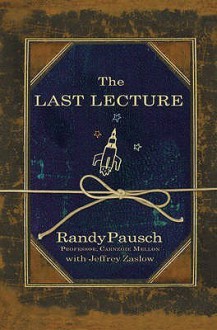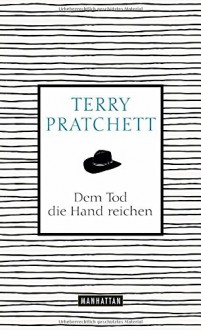
A lot of professors give talks titled "The Last Lecture." Professors are asked to consider their demise and to ruminate on what matters most to them. And while they speak, audiences can't help but mull the same question: What wisdom would we impart to the world if we knew it was our last chance? If we had to vanish tomorrow, what would we want as our legacy? When Randy Pausch, a computer science professor at Carnegie Mellon, was asked to give such a lecture, he didn't have to imagine it as his last, since he had recently been diagnosed with terminal cancer. But the lecture he gave--"Really Achieving Your Childhood Dreams"--wasn't about dying. It was about the importance of overcoming obstacles, of enabling the dreams of others, of seizing every moment (because "time is all you have...and you may find one day that you have less than you think"). It was a summation of everything Randy had come to believe. It was about living.
In this book, Randy Pausch has combined the humor, inspiration and intelligence that made his lecture such a phenomenon and given it an indelible form.
Amazon.com
"The Last Lecture" idea is one that a number of universities host in which a highly regarded professor is asked to imagine they were just given the news that they were to die soon, then tailor a unique lecture incorporating what advice they would offer or life lessons they've experienced that they'd want to share with others. Randy Pausch, a computer science professor at Carnegie Mellon University as well as a professor of technology at the University of Virginia, was given such a task but in his case he truly was nearing death at the time he offered his lecture. Shortly before giving this lecture, Pausch had been diagnosed with terminal pancreatic cancer, his doctors notifying him he had mere months of life left. But Pausch points out early on that once he agreed to do the lecture, he didn't want the focus to be on his impending death but instead on how he managed to fulfill his dreams with the time he had been given.
In addition to being a college professor, Pausch was also an award-winning researcher for tech companies such as Adobe, Google, EA (Electronic Arts gaming company) and Walt Disney Imagineers, so he had plenty of life experience to pull from to craft his message! Pausch came from a family that strongly endorsed educating yourself -- go to the library, crack open some reference books, find the answers yourself, go for walks and think on a subject, that sort of thing. His parents also taught him to be tenacious. He writes of first getting established in his technology career during the 1960s-70s and being reminded of Captain Kirk's line in Star Trek: Wrath of Khan: "I don't believe in a no-win situation." Pausch's parents' lessons on building a tenacious spirit served him well, spurring him in later years to pay it forward, in a way, when he imparts his own version of the idea to his students: "Brick walls are there not to keep you out, but to teach you how badly you want to get to the other side."
The most formidable wall I ever came upon in my life was just five feet, six inches tall, and was absolutely beautiful. But it reduced me to tears, made me reevaluate my entire life and led me to call my father, in a helpless fit, to ask for guidance on how to scale it.
That brick wall was Jai.
~ Randy Pausch on first meeting his wife, Jai.
Pausch tells of an early experience of trying to get a job with Disney. He desperately wanted a spot on the Imagineers team and had to spend years using that well-worn tenacity before he even got an interview with anyone. As he puts it, they regularly sent him "the nicest go to hell letters ever ". He eventually went on to take a job as a professor at the University of Virginia because, y'know, dreams are great but bills still gotta stay paid! In 1995, while he was working at this university, Pausch heard news of a team of Imagineers struggling with a project to create low-cost virtual reality technology for Disney's Aladdin park attraction. Once again, Pausch found himself regularly contacting Disney offering his knowledge. FINALLY, his efforts payed off and he was patched through to one of the leaders of the Aladdin project. But his work wasn't done. It took Pausch more schmoozing, getting the guy to agree to meet with him over lunch and hear his ideas, before Pausch truly got a foot in the door.
Pausch also admits that it's beneficial to have at least a few "tough love" friends in your life who will give it to you straight, even if the truth hurts. He tells of some of his close friends who would sit him down and tell him at various times when he was being arrogant, brash, tactless, always correcting people yet being stubborn and contrary if he himself was ever corrected. Essentially, they would let him know whenever his sometimes hypocritical nature was driving people away. So Pausch recommends that its important for flaws to be "social rather than moral".
The Last Lecture, as presented here, is a book translation of Pausch's original speech at his college. Pausch's ideas were molded into book form with the help of Wall Street Journal columnist Jeffrey Zaslow, who was present in the audience at the original lecture. Pausch's words got such rave reviews, people immediately clamored for a book form they could gift to friends, family, co-workers, etc.
This book has gotten a flood of rave reviews pretty much since its day of publication. Pausch does offer some nice morsels of inspiration such as:
- *Give yourself permission to dream
- * Stay humble. "No job is beneath you."
- * "Experience is what you get when you didn't get what you want."
All nice, warm sentiments but IMO Pausch didn't always consume what he was selling others. There were a number of passages here that came off pretty self-congratulatory. To some extent, one can cut the guy some slack, he was nearing death. Still, in my mind, even death shouldn't allow one to go out on too smug a note. There were some things about this guy that just REALLY bugged me. Choosing to do a speaking engagement over being at home for your wife's birthday when you both know you won't get another chance to celebrate? Nope, sorry, not cool. And the whole ranking system he did with his students where everyone was publicly given a rating from worst to greatest and him claiming he was "doing them a favor." Whaa?! I know this book is well loved by many but there were just some things here that screamed "jerk" to me.

 Log in with Facebook
Log in with Facebook 









